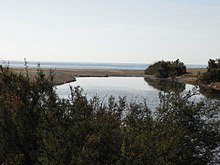The river Guadalmina (from the Arabic for "Wadi (river) of the port") is a short coastal river of the Mediterranean basin in southern Spain that runs entirely within the Andalusian province of Málaga.
| Rio Guadalmina | |
|---|---|
 Mouth of the Guadalmina River between Marbella and Estepona | |
 | |
| Location | |
| Country | Spain |
| Physical characteristics | |
| Source | |
| • location | Igualeja, Sierra Bermeja, Spain |
| Mouth | |
• location | Mediterranean Sea, Málaga, Spain |
• coordinates | 36°27′36″N 5°0′19″W / 36.46000°N 5.00528°W |
• elevation | 0 m (0 ft) |
| Length | 28 km (17 mi) |
| Discharge | |
| • location | mouth |
Only 28 kilometres (17 mi) in length, the Guadalmina rises in the Sierra Bermeja, in the municipality of Igualeja, but its main course begins below the mountains in the municipality of Benahavís, forming a karst aquifer in an area known as Las Angosturas (the narrows).[1][2] The river flows into the municipality of Marbella near San Pedro de Alcántara, and serves to delimit its border from that of the municipality of Estepona.
The Guadalmina was formerly of defensive strategic importance for the people of Marbella; its waters also served to power watermills for grinding grain into flour. The La Concepción reservoir is the primary water source for this municipality; it is formed by a diversion dam on the Río Verde, where the waters of the rivers Guadalmina, Guadalmansa and Guadaiza join and are captured,[3] then transported to provide the water supply of the Costa del Sol towns of Benalmadena, Fuengirola, Mijas, Benahavís, Marbella, Casares and Manilva.

The lower course of the river is heavily urbanized; many homes there have a high risk of inundation.[4][5]
Near the river's mouth, next to San Pedro de Alcántara, are the important archaeological sites of the early 4th-century Christian church Basílica de Vega del Mar, the 3rd-century vaulted Roman baths of Las Bóvedas (the Domes) and the eponymous watch tower of Torre de Las Bóvedas.[6]
References
edit- ^ Diego Vázquez Otero (1966). Pueblos malagueños. Urania. p. 239. Retrieved 23 June 2013.
Más apartados se ven los meandros del Guadalmina, con remansos tan profundos como el Charcón, encajados aquéllos en el río hasta perderse en las "Angosturas", entrecruzándose en la lejanía una serie de crestas y picos...
- ^ Boletín geológico y minero. 1919. p. 243. Retrieved 23 June 2013.
- ^ Gómez Zotano, José (2006). "El paisaje de la colonia agrícola de san pedro alcántara (provincia de Málaga). Bases naturales y reconstrucción geohistórica a través del catastro". Cuadernos Geográficos (38). ISSN 0210-5462. Retrieved 23 June 2013.
Los principales aportes de agua en la zona proceden, junto a la lluvia, de la red hidrográfica superficial y de los acuíferos. La red hidrográfica superficial está compuesta por un conjunto de cuencas independientes, que desaguan todas ellas en el Mediterráneo. Esta red presenta cauces de trazado poco sinuoso y dirección meridiana en lo general. Las principales cuencas son las del Guadalmansa (24 km de longitud y 59 km2 de cuenca) Guadalmina (22,4 km y 67,4 km2) y Guadaiza (20 kmy 45,6 Km2). Completan el conjunto un número de cursos más pequeños como Cañas Verdes, Saladillo, Dos Hermanas, Chopo, etc., también de trazado meridiano en lo general.
- ^ Juana Viúdez (18 September 2007). "Veinte urbanizaciones de Marbella tienen alto riesgo de inundación". El País. Retrieved 23 June 2013.
...en el río Guadalmina se incluyen como alto riesgo las viviendas de la urbanización Guadalmina Alto, las Yucas y Casasola.
- ^ Cristina González (19 November 2011). "Marbella reclama a la Junta que limpie diez arroyos para prevenir inundaciones". Diario Sur. Retrieved 23 June 2013.
- ^ United States. Hydrographic Office (1916). Mediterranean Pilot: Strait of Gibraltar, south and southeast coast of Spain, African coast from Cape Spartel to Gulf of Gabes-including the Balearic Islands. Hydrographic Office under the authority of the secretary of the navy. p. 140. Retrieved 29 January 2013.